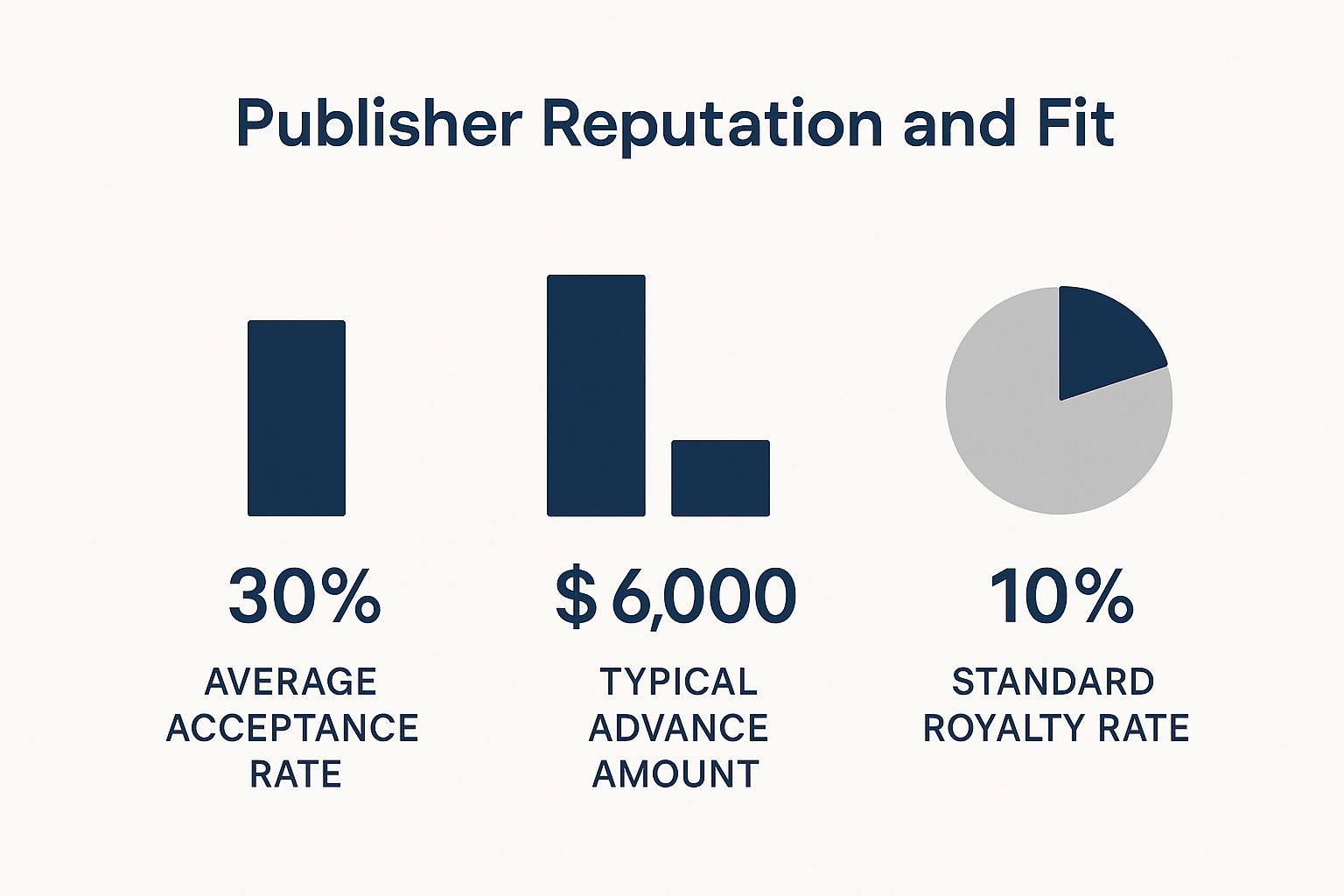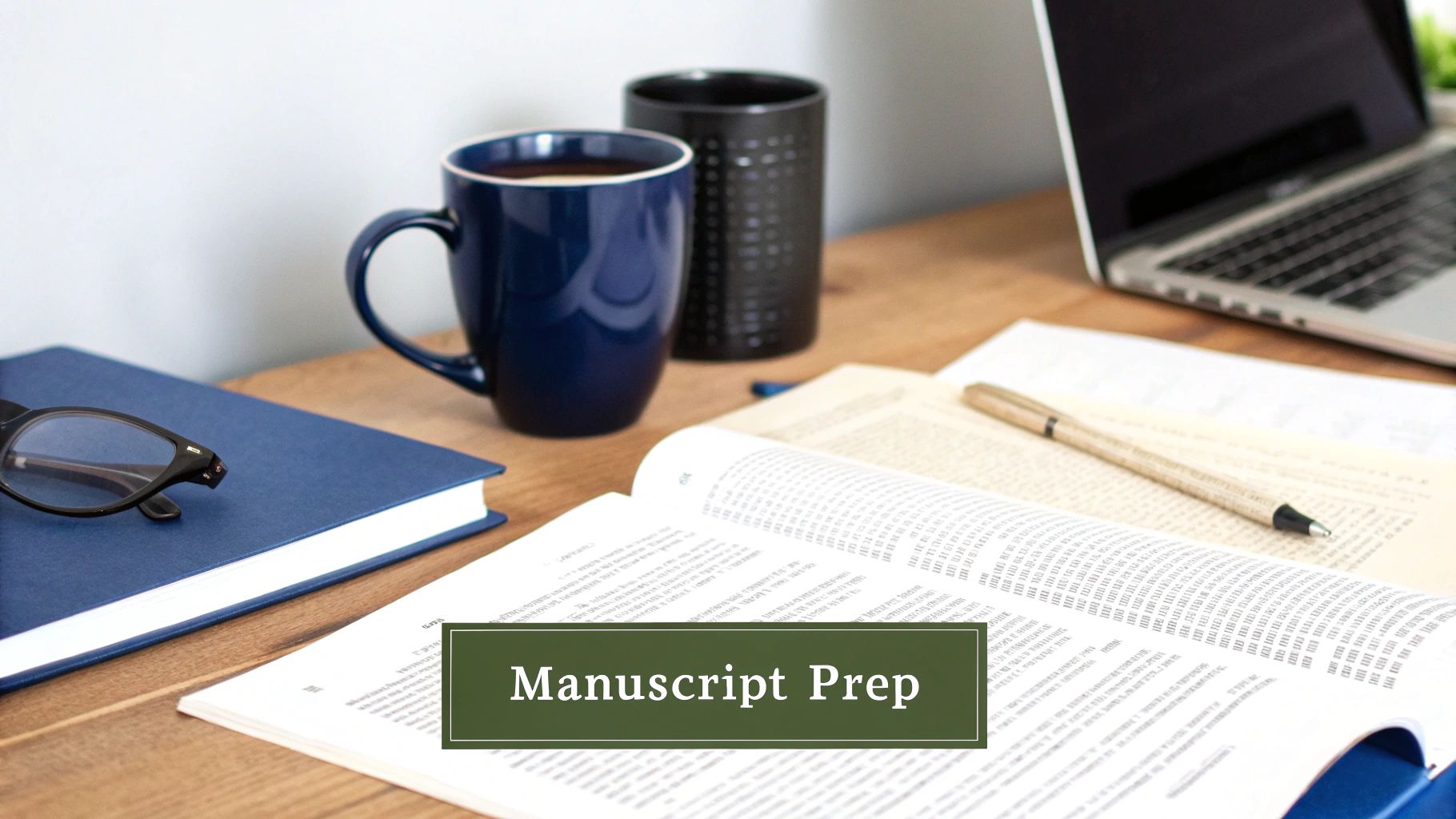Alright, let's get your manuscript ready for the big leagues. Before you even think about creating a list of dream publishers, your book needs to be in fighting shape. This is where so many aspiring authors stumble—they rush the process.
A finished first draft is a huge accomplishment. Celebrate it! But it’s the starting line, not the finish. Submitting a raw manuscript is the fastest way to get a rejection.
Polishing Your Manuscript: The Non-Negotiable First Step
Think of it this way: agents and editors are inundated with submissions. A polished, professionally edited manuscript instantly tells them you’re a serious author who respects their time and the craft of writing. It’s your first, and often only, chance to make a great impression.
This goes way beyond running a spell check. You need to invest in professional editing. I've seen countless promising stories get passed over simply because the manuscript wasn't ready. Different editing stages tackle different problems, and skipping one is like building a house without a proper foundation.
-
Developmental Editing: This is the "big picture" edit. A developmental editor looks at your plot, pacing, character development, and overall structure. Is the story compelling? Does the timeline make sense? They help you fix fundamental story problems before you worry about commas.
-
Copyediting: Once the story is solid, a copyeditor dives into the nitty-gritty. They focus on the sentence level—polishing your prose, fixing grammar, and ensuring your style is consistent from start to finish.
-
Proofreading: This is the final cleanup. A proofreader is your last line of defense against sneaky typos, punctuation errors, or formatting glitches that everyone else missed.
Do You Know Where Your Book Belongs?
Before you research a single publisher, you have to know your book inside and out. Who is it for? Where would it sit on a bookstore shelf? Publishers are specialists. The house that publishes groundbreaking sci-fi isn't going to be interested in your cozy mystery, and vice versa.
Being crystal clear on your genre and target audience is crucial. It saves you from wasting months sending your manuscript to all the wrong places.
A polished manuscript is your professional handshake. It demonstrates that you understand the industry, respect the publisher's time, and are committed to producing a high-quality book that has commercial potential.
Protecting your work is also part of being a professional. It’s smart to understand how to copyright your work early on. And while your publisher will handle the ISBN, getting familiar with the nuts and bolts of the industry is never a bad idea. Our guide on how to get an ISBN for a book can give you some background.
The global book publishing market is massive—it's projected to hit nearly USD 149.19 billion by 2035. Publishers are actively looking for authors who are ready to compete in that market. You can read more about the growth of the book publishing market and what it means for authors. Taking these prep steps seriously shows them you're one of those authors.
Finding the Right Publishers for Your Book
So, you've polished your manuscript until it shines. Now comes the real detective work: finding the right home for your book. Sending your manuscript out blindly is like throwing darts in the dark. The secret is to create a smart, targeted list of publishing houses that are actually looking for a book just like yours. This is how you get noticed.
Your first stop should be the tools the pros use. Think of these databases as your inside track to the publishing world.
Using Professional Publishing Databases
Two of the best resources out there are Publishers Marketplace and Writer's Market. Yes, they often require a subscription, but that small investment can save you months of wasted effort and rejection. These platforms are goldmines of information, letting you filter publishers by genre, track recent book deals, and pinpoint specific editors who are actively acquiring books in your category.
For instance, you can search for "YA fantasy" and immediately see which editors just bought manuscripts in that exact niche. That tells you who's hungry for more. It’s powerful intel.
This glimpse into Publishers Marketplace shows you the kind of data you can get—who the agent was, the editor, and the publishing house for recent deals.

When you can see this level of detail, you're no longer guessing. You're making data-driven decisions and targeting editors with a proven interest in your work.
Here’s another fantastic, and often overlooked, trick: head to your bookshelf. Pick out five to ten recently published books that feel like cousins to your own—similar genre, tone, and target audience.
Turn to the acknowledgments page. Authors almost always thank their editor and agent by name. It’s a simple hack, but it’s one of the most effective ways to build a list of industry pros who already love the kind of story you tell.
Analyzing Publisher Fit
Once you have a list of potential publishers, it's time to put on your researcher hat again. A publisher's website is a decent starting point, but you need to go deeper. Look at their current catalog, not just the bestsellers they published five years ago. Tastes change, editors move, and a publisher's focus can shift.
As you vet each one, ask yourself some tough questions:
- Do their recent acquisitions match my book? Check out what they’ve published in the last 12-18 months. Is your book a good fit for that list?
- What's their market presence like? Can you find their books in actual bookstores? Do they have a solid social media presence or do their marketing efforts feel dated?
- What kind of publisher are they? Your approach for one of the "Big Five" (think Penguin Random House) will be completely different from how you’d pitch a small indie press or a niche university press.
The "Big Five" are the giants. They almost always require you to have a literary agent, but they offer bigger advances and massive distribution. On the other hand, many independent presses are open to submissions directly from authors and are often passionate about championing unique voices. University presses can be a perfect home for scholarly or highly specialized nonfiction.
Understanding these distinctions is crucial. It helps you channel your energy where it has the best chance of paying off, ensuring you find not just any publisher, but the right one to bring your book into the world.
Finding a Literary Agent to Champion Your Work
For most authors dreaming of a spot on a major bookstore shelf, a literary agent is more than just a good connection—they're a necessity. The reality is, the vast majority of large publishing houses, especially the "Big Five," do not accept unsolicited manuscripts. Period. Sending your manuscript directly to them is like shouting into the void; it's not that your story isn't amazing, but their entire system is designed to work through agents.
Think of a literary agent as your personal advocate in the publishing maze. They're your business partner, your toughest negotiator, and your career guide, all in one. A good agent doesn't just like your book; they believe in it. They have the contacts to get your manuscript past the slush pile and into the hands of the right editors—the ones actively searching for a story just like yours. Their mission is to champion your work and land you the best possible deal.
Identifying the Right Agent for Your Book
Finding an agent isn't about blasting your manuscript out to everyone with an email address. It’s a targeted search, much like finding the right publisher. You need to find agents with a proven track record of selling books in your specific genre. An agent who’s a star in the historical fiction world is probably the wrong person for your gritty sci-fi thriller.
So, how do you find these people? You build a carefully curated list.
- Read the Acknowledgments: Grab a few recently published books in your genre. Flip to the back. Authors almost always thank their agent by name. This is a golden ticket to finding agents who are already passionate about your kind of story.
- Dig into Online Databases: Websites like Publishers Marketplace, QueryTracker, and the Manuscript Wish List (#MSWL on social media) are indispensable. These tools let you see who agents represent, what they’re currently looking for, and their recent sales.
- Study Agency Websites: Once you have a name, do your homework. Go to their agency's website. Read the agent's bio, check out their client list, and—most importantly—read their submission guidelines. Following those instructions to the letter is your first test. Don't fail it.
Writing a Query Letter That Gets Noticed
Your query letter is everything. It's your first impression, a one-page sales pitch for both your book and yourself. It has to be sharp, professional, and impossible to put down.
Most query letters have three core parts: the hook, a mini-synopsis, and your author bio.
That opening paragraph—the hook—has to do some heavy lifting. It needs to grab them from the first sentence. Instead of saying, "My novel is a fantasy about dragons," try to create immediate intrigue: "For centuries, the cartographers of Aeridor have lied. The dragons they paint at the edges of the map aren't warnings; they're prisoners, and one of them just escaped." See the difference?
Personalization is also crucial. Show the agent you're not just spamming a list. Mention why you chose them specifically. Referencing a book they sold or a client they represent proves you've done your research and respect their work.
A query letter is more than a summary; it's an audition. It demonstrates your writing craft, your understanding of the market, and your professional courtesy all on a single page.
Once your agent starts shopping your manuscript around, you'll need to evaluate the publishers who show interest. This is where an agent's expertise really shines.

The data here shows the trade-offs you often face—higher advances from major publishers usually come with much lower acceptance rates. An agent helps you navigate these choices.
To get a complete picture of the entire publishing journey, from finding that perfect agent to finally signing a contract, check out our in-depth guide on how to get a book published. Securing the right agent is the first, and most critical, step on that path.
Publishing Path Comparison: Agented vs. Direct Submission
While a literary agent is the standard route for traditional publishing, some authors find success by submitting directly to smaller, independent presses that accept unsolicited manuscripts. Each path has its own set of advantages and challenges. Understanding these differences can help you decide which strategy aligns best with your career goals and the specific book you've written.
| Feature | Agented Submission | Direct Submission (to small presses) |
|---|---|---|
| Access to Publishers | Unlocks access to major publishers ("Big Five") and their imprints. | Primarily limited to small, independent, or university presses. |
| Negotiation Power | Agent negotiates contract terms, advances, and rights on your behalf. | Author is responsible for all contract negotiations and legal review. |
| Career Management | Agent provides long-term career guidance and strategy. | Focus is typically on a single book deal; no career management. |
| Credibility & Vetting | An agent's interest provides a powerful endorsement of your work. | The manuscript must stand entirely on its own merit. |
| Submission Process | Agent manages submissions and communications with editors. | Author must research, track, and manage all submissions personally. |
| Speed to Offer | Can be faster once the agent has the manuscript, due to direct editor contacts. | Can be a very slow process, with long response times from publishers. |
| Author's Cut | Agent receives a commission, typically 15% of domestic sales. | Author receives 100% of the publisher's advance and royalties. |
Ultimately, the choice between seeking an agent and submitting directly depends on your ambitions. If you're aiming for the big leagues with a major publisher, an agent is your only real ticket in. If you have a niche book and are comfortable handling the business side yourself, direct submission to a small press could be a viable and rewarding option.
Crafting a Professional Submission Package
You’ve done the hard work of building a targeted list of agents and publishers. Now comes the moment of truth: creating a submission package that actually gets read. This is your first real introduction, and you need to present yourself as a professional author who understands how this industry works. One simple mistake here, and your manuscript could land in the slush pile before anyone even reads the first sentence.
A polished submission isn't just about your manuscript. It's a collection of carefully prepared documents, each serving a distinct purpose. Getting these right shows you respect the agent's time and are serious about your writing career.

What Goes into a Submission Package?
Think of your submission package as the complete sales kit for your book. While the specifics can vary from one agent to the next, most will expect a few standard components, all executed perfectly.
- The Query Letter: This is your one-page sales pitch. It has to be sharp, concise, and personalized for each agent you contact.
- A Compelling Synopsis: A one- to two-page summary of your entire story—spoilers and all. This is where you prove you can structure a compelling plot from beginning to end.
- Your Opening Pages: Agents typically ask for the first 5-10 pages or the first chapter. These pages must be flawlessly formatted and, most importantly, hook the reader from the opening line.
Your submission package is your audition. Every document, from the query letter to the manuscript formatting, is a reflection of your professionalism and writing craft. Don't give an agent any reason to doubt your seriousness.
The Golden Rule: Follow the Guidelines
If you take away only one piece of advice, let it be this: meticulously follow each agent's or publisher's specific submission guidelines. I can't stress this enough. This is the hurdle where so many promising authors stumble.
One agent might want the first ten pages pasted directly into an email. Another might request the first three chapters as a PDF attachment. Ignoring these instructions screams that you can't follow directions—a massive red flag for anyone considering a long-term partnership with you.
For nonfiction authors, the core of the submission is the book proposal. This isn't just a summary; it's a full-blown business plan for your book. It needs to make a strong case for why the market needs your book, detail your author platform and expertise, provide a chapter-by-chapter outline, and include polished sample chapters.
Putting in this effort is essential in today's market. Between 2025 and 2029, the global publishing industry is projected to grow by USD 18.9 billion, driven by digital publishing and new technologies. While North America is still a major player, the industry is expanding worldwide. You can read more about the global publishing market's expansion and trends on Supadu.com. A professional submission package shows you're ready to compete on that stage.
How to Evaluate a Publishing Offer
Getting that first publishing offer feels like the finish line. It’s a huge moment, a massive validation of all the late nights and hard work. But before you pop the champagne, take a deep breath. This is where the real work begins.
You’re not just selling a book; you’re choosing a business partner. The advance is certainly exciting, but it’s just one part of a much bigger relationship. The right publisher is one who not only loves your book but also has the right team and resources to help it find its audience.

Now is the time to get granular and ask some tough, specific questions. Don’t hold back—a transparent, professional publisher will appreciate your thoroughness. While your agent will take the lead, you need to be armed with the right information to make a smart decision.
Scrutinizing the Marketing and Publicity Plan
A publisher's excitement for your manuscript needs to be backed up by a concrete plan. Vague promises about "social media promotion" and "outreach" just won't cut it. You need to see a real strategy.
Drill down with these questions:
- What is the specific marketing budget for my book? This number tells you exactly how much skin they have in the game.
- Which media outlets and reviewers are you targeting? Are their contacts a good fit for your genre? Do they have a track record of landing reviews in places that matter?
- Is there a budget for Advanced Reader Copies (ARCs)? Getting early copies to reviewers and influencers is absolutely critical for building pre-launch buzz.
- What’s your plan for online advertising? Will they be running targeted ads on Amazon, Facebook, Goodreads, or BookBub?
Take a look at how they handle their current authors. Check out their social media feeds. Are they actively engaging with readers and creatively promoting their books, or is it just a graveyard of static cover images? Their online presence is a direct reflection of their commitment.
A publishing offer is a starting point, not a finish line. The true value of a deal lies in the publisher's commitment to marketing, distribution, and a digital strategy that gives your book its best chance in a competitive market.
Evaluating Their Digital and Distribution Reach
The book world is more digital than ever. The global digital publishing media market hit a valuation of US$45.36 billion in 2024 and is expected to grow by 13.3% each year. Any publisher without a rock-solid digital game plan is playing catch-up.
When you're looking at their backlist, check for consistency in their digital formats. Do they produce ebooks and audiobooks for all their titles? A publisher who frequently outsources audio rights or skips them entirely might be leaving money—and readers—on the table.
Finally, don’t forget about their physical distribution network. A publisher’s power to get your book onto actual bookstore shelves is still a huge piece of the puzzle. Ask them which major retailers and distributors they partner with. Can you find their books in big chains like Barnes & Noble and in the curated aisles of independent bookstores?
For new writers, figuring this all out can be daunting. Our guide on finding the best publishing company for new authors can help you navigate these crucial early steps. A partner with a wide and effective distribution network ensures your book has a chance to be discovered by readers everywhere.
Your Top Publishing Questions, Answered
Walking the path to publication brings up a lot of questions. I’ve heard just about all of them over the years. Let’s cut through the noise and get you some clear, direct answers to the most common concerns I see from authors.
Do I Need to Copyright My Book Before I Submit It?
This is a big one, but the short answer is no, you don't have to. Legally, your work is copyrighted the moment you write it down. Think of it as automatic.
That said, formally registering your work with the U.S. Copyright Office gives you a public record of ownership and much stronger legal footing if you ever need to defend it. Most traditional publishers will handle the official registration for you once they offer you a contract. Some authors, however, choose to register it themselves beforehand just for that extra peace of mind.
How Much Does It Cost to Get Published Traditionally?
Getting a traditional publishing deal should cost you exactly $0. Let me say that again: you should not pay a dime.
Legitimate publishers and literary agents make their money by selling your book, not by charging you fees. The publisher is the one who invests in your book—they pay for the editing, cover design, printing, and marketing. You earn money through an advance (an upfront payment against future sales) and royalties.
Key Takeaway: In traditional publishing, the money flows to the author. If a company asks you to pay for anything related to publishing your book, they are not a traditional publisher. They are likely a hybrid press or a vanity press, which is a completely different business model.
How Much Can I Quote From Other Works Without Getting in Trouble?
"Fair use" is one of the trickiest concepts in publishing. There isn't a hard-and-fast rule, like a magic word count (the "300-word rule" is a myth), that automatically makes a quote okay. It’s a nuanced legal doctrine that depends on a few key factors: how much you’re using, why you’re using it, and whether your use could hurt the original work's sales.
Here are a few practical tips to keep you safe:
- Facts and titles are always fine. You don't need permission to mention another book's title or its author.
- Poetry and song lyrics are the riskiest. Because these works are so short, even quoting one or two lines can be a copyright issue. My advice? Almost always seek official permission.
- When in doubt, don't quote. Paraphrasing an idea is much safer than lifting a direct quote. If a quote is absolutely essential to your work, the safest bet is to contact the rights holder (which is usually the original publisher) and ask for permission.
What if My Book Doesn't Get an Offer?
First, take a deep breath. Rejection is a rite of passage in this industry. Every successful author I know has a folder full of rejections—it’s just part of the game.
If your first round of submissions doesn't land you an offer, it’s not the end of the road. It’s a signal to step back and reassess. This is where feedback becomes your best friend. Talk to your agent (if you have one) or go back to your trusted beta readers.
More often than not, it simply means the manuscript needs another round of deep revisions before you send it out to a new list of agents or publishers. This whole process is a marathon, not a sprint.
Ready to transform your manuscript into a professionally published book? BarkerBooks offers end-to-end support, from editorial services to global distribution, helping you achieve your dream of becoming a published author. Learn more about our publishing packages.
